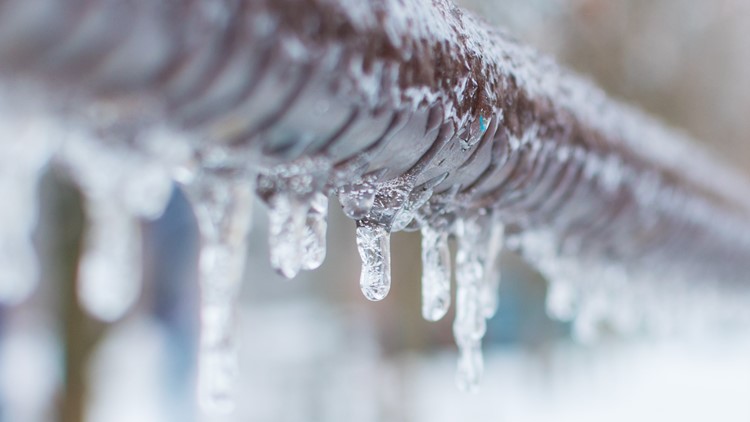Shielding Your Pipes from Freezing Damage: Critical Approaches
Shielding Your Pipes from Freezing Damage: Critical Approaches
Blog Article
We've stumbled upon this article relating to 6 Ways to Prevent Frozen Pipes below on the web and accepted it made sense to write about it with you over here.

Cold weather can wreak havoc on your pipes, particularly by freezing pipes. Right here's how to prevent it from happening and what to do if it does.
Intro
As temperatures decrease, the risk of frozen pipelines rises, potentially bring about expensive repairs and water damages. Recognizing how to avoid icy pipes is crucial for property owners in cold environments.
Avoidance Tips
Insulating at risk pipes
Cover pipelines in insulation sleeves or use heat tape to secure them from freezing temperature levels. Concentrate on pipelines in unheated or exterior locations of the home.
Home heating techniques
Keep indoor rooms properly heated up, especially locations with plumbing. Open cupboard doors to enable cozy air to flow around pipelines under sinks.
Exactly how to recognize icy pipes
Try to find lowered water circulation from taps, uncommon smells or noises from pipelines, and noticeable frost on revealed pipelines.
Long-Term Solutions
Architectural changes
Consider rerouting pipes away from exterior walls or unheated areas. Include extra insulation to attics, cellars, and crawl spaces.
Updating insulation
Buy premium insulation for pipes, attics, and wall surfaces. Proper insulation assists keep regular temperature levels and lowers the risk of icy pipelines.
Shielding Exterior Pipes
Garden pipes and outdoor taps
Separate and drain yard pipes before wintertime. Mount frost-proof spigots or cover exterior taps with protected caps.
Understanding Frozen Pipes
What triggers pipelines to ice up?
Pipes ice up when exposed to temperature levels below 32 ° F (0 ° C) for prolonged periods. As water inside the pipelines ices up, it broadens, taxing the pipe wall surfaces and potentially causing them to rupture.
Threats and problems
Frozen pipelines can result in water system disturbances, residential or commercial property damage, and costly repairs. Burst pipelines can flood homes and trigger substantial architectural damage.
Indicators of Frozen Piping
Determining icy pipes early can prevent them from breaking.
What to Do If Your Pipelines Freeze
Immediate activities to take
If you presume icy pipelines, keep taps available to soothe stress as the ice thaws. Utilize a hairdryer or towels taken in warm water to thaw pipelines slowly.
Final thought
Avoiding frozen pipelines needs positive steps and fast feedbacks. By understanding the causes, indications, and safety nets, homeowners can shield their plumbing throughout winter.
Helpful Tips to Prevent Frozen Pipes this Winter
UNDERSTANDING THE BASICS: WHY PIPES FREEZE AND WHY IT’S A PROBLEM
Water freezing inside pipes is common during the winter months, but understanding why pipes freeze, and the potential problems it can cause is crucial in preventing such incidents. This section will delve into the basics of why pipes freeze and the associated problems that may arise.
THE SCIENCE BEHIND FROZEN PIPES
When water reaches freezing temperatures, it undergoes a physical transformation and solidifies into ice. This expansion of water as it freezes is the primary reason pipes can burst. As the water inside the pipe freezes, it expands, creating immense pressure on the walls. If the pressure becomes too great, the pipe can crack or rupture, leading to leaks and water damage.
FACTORS THAT CONTRIBUTE TO PIPE FREEZING
Low Temperatures: Extremely cold weather, especially below freezing, increases the risk of pipes freezing. Uninsulated or Poorly Insulated Pipes: Pipes located in unheated areas, such as basements, crawl spaces, or attics, are more prone to freezing. Insufficient insulation or lack of insulation altogether exacerbates the problem. Exterior Wall Exposure: Pipes running along exterior walls are susceptible to freezing as they encounter colder temperatures outside. Lack of Heating or Temperature Regulation: Inadequate heating or inconsistent temperature control in your home can contribute to frozen pipes. PROBLEMS CAUSED BY FROZEN PIPES
- Pipe Bursting: As mentioned earlier, the expansion of water as it freezes can cause pipes to burst, resulting in significant water damage.
- Water Damage: When pipes burst, it can lead to flooding and water damage to your property, including walls, ceilings, flooring, and personal belongings.
- Structural Damage: Prolonged exposure to water from burst pipes can compromise the structural integrity of your home, leading to costly repairs.
- Mold and Mildew Growth: Excess moisture from water damage can create a favorable environment for mold and mildew growth, posing health risks to occupants.
- Disrupted Water Supply: Frozen pipes can also result in a complete or partial loss of water supply until the issue is resolved.
WHY CERTAIN PIPES ARE MORE PRONE TO FREEZING
- Location: Pipes located in unheated or poorly insulated areas, such as basements, crawl spaces, attics, or exterior walls, are at higher risk of freezing.
- Exterior Pipes: Outdoor pipes, such as those used for irrigation or exposed plumbing, are particularly vulnerable to freezing as they are directly exposed to the elements.
- Supply Lines: Pipes that carry water from the main water supply into your home, including the main water line, are critical to protect as freezing in these lines can affect your entire plumbing system.
- Underground Pipes: Pipes buried underground, such as those connected to sprinkler systems or outdoor faucets, can be susceptible to freezing if not properly insulated.
https://busybusy.com/blog/helpful-tips-to-prevent-frozen-pipes-this-winter/

I found that blog posting on Helpful Tips to Prevent Frozen Pipes this Winter when surfing the search engines. If you enjoyed our blog entry plz don't forget to pass it around. Thanks a lot for being here. Please come by our website back soon.
Book A Free Estimate Report this page